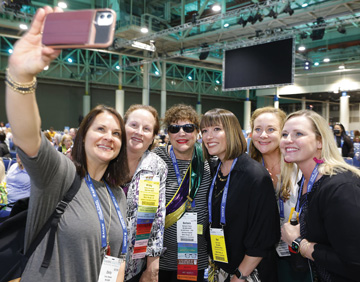There are plenty of ways for surgical nurses to develop their leadership skills outside of the OR. Nurses who share their expertise enhance their own knowledge and skill level and help to promote a safer workplace environment. There is no magic formula to know when it’s the right time for nurses to seek a leadership position. It’s instinctual, a personal process of self-reflection that causes an individual to expand their reach and find their strengths that will impact others in a positive way. The desire to give back to one’s profession through selfless service pays dividends, such as personal insights, invaluable experience and added confidence. Stepping out of one’s comfort zone and pursuing opportunities to grow professionally and personally can be an important step for perioperative nurses who have the desire to contribute something that will have a lasting impression on the profession.
- Home
- The Magazine
- Article
Learning How to Lead
By: David L. Taylor III, MSN, RN, CNOR; Heidi L. Nanavati, MSN, CRNP, CNOR; Jamie Ridout, MSN, MBA, RN, CNOR, NEA-BC, CASC; Laura A. Gayton, MHA, BSN, CNOR, CSSM; Leilani A. Salimone, DNP, RN, NEA-BC, CNOR
Published: 7/11/2022
Perioperative nurses should be proactive in seeking out opportunities to advance their careers and strengthen the nursing profession.
Pathways to leadership

Leadership requires learning from mistakes and continually working at strengthening weaknesses. Development as a leader can come from different experiences throughout one’s career, volunteer roles and personal life. Some ways to develop leadership skills are assuming more responsibility, such as taking charge of a project, eliciting the help of a mentor and accepting performance feedback while applying changes in practice.
There are many leadership characteristics cited in research, including confidence, humility and integrity. Being courageous, accountable and honest as well as having respect for others, being trustworthy and empathetic also play a role. It’s also vital to be able to control one’s emotions in a challenging or stressful time and be open to learning from others’ ideas. Social development and making meaningful connections with colleagues are important as well. Lastly, understand that leadership and learning go together and are a continual, lifelong journey. The Association of periOperative Registered Nurses (AORN) says successful leaders never stop learning or growing personally and professionally. They pick up pearls of knowledge at every opportunity and string them together to enhance performance that leads to success.
AORN provides opportunities to serve at many levels, enabling volunteers with varying backgrounds and experience to provide their insights and expertise, grow as leaders and help the organization. Much of the work accomplished by AORN is done by volunteers. Their commitment to the nursing profession has been an indispensable resource for evidence-based practice and education that has established the standards of excellence in the delivery of perioperative nursing care we know today. The pathway to a leadership position within AORN is not always a quick or easy journey. It takes time and a high level of commitment.
• Starting locally. Many leaders begin their journey at the chapter or state level. Serving at this level allows nurses to gain insight into their own abilities, as well as learn and understand the skills required to serve in a higher capacity. It enables them to understand how a national nursing organization can impact their own career and analyze factors impacting the entire nursing profession.
Having a long-range vision to lead, educate, inspire others and promote the mission of AORN is vital to know if the time is right to work toward a national leadership position. Getting involved in one of AORN’s 200 national chapters is available to every member. Local chapter activities include committee work, volunteering at community events, fundraising and planning seminars. Each chapter has its own leadership structure made up of officers, a board of directors and a nominating committee. Serving at the chapter level is the ideal place to gain leadership experience before looking for a national-level leadership position.
AORN currently has 26 state councils focused on policy, education and practice issues affecting perioperative nursing. This is a great way to develop leadership skills at the local and state level. State councils offer varying degrees of responsibilities. Like local chapters, state councils have elected positions and are governed by a set of bylaws. They are supportive of local chapters and help drive national AORN initiatives through lobbying activities.
• National opportunities. AORN specialty assemblies represent perioperative specialties by groups, some of which include nurse educator, registered nurse first assist, ambulatory surgery, informatics, sterile processing/supply chain management and pediatric. Volunteering to be on the coordinating council or one of the specialty committees is a great way to develop leadership skills. Working together with other council members for the greater good of the assembly helps move the organization forward.
Growing to be a leader of this caliber takes time, commitment, perseverance and an open mind.
Completing a Willingness to Serve form, which is posted on the AORN website, for a specific committee or task force is the first step to being included on committees at the national level. The list of opportunities changes annually. A few examples include the awards committee, scholarship committee and continuing education approval unit. Willingness to Serve forms are used to assign members to the needed volunteer positions. In addition, there are other ad hoc committees that form each year and end when the work is completed.
The upside to volunteering to serve on a committee is it not only helps the organization, it can enrich your life in so many ways. Often, volunteering is a shared experience, so the workload is lightened by many hands. In return, individuals gain a tremendous amount of experience and learn more about their abilities and how to work with others. As an individual’s confidence grows, so does their willingness to take on more complex projects. Volunteers learn firsthand what an organization is striving to accomplish and become the voice of the collective that the organization is trying to help and support.
Volunteering is a calling to many types of people from different walks of life. As a result, volunteers learn to grow their network, both personally and professionally. Volunteering also serves as a compass, providing a clearer path in one’s professional life. It teaches how to have a vision for a cause, and to pursue it passionately. Lastly, volunteering can build strong bonds among those who work together.
Other ways to develop leadership skills at the national level include publishing an article, conducting a podium presentation or submitting poster projects to a conference. These opportunities foster peer-to-peer interaction, collaboration and networking. In addition, the feedback received through these experiences can provide personal and professional growth.
Volunteering at AORN’s annual Expo conference is another great way to network with peers and demonstrate an interest in national leadership. Some of these volunteer activities include assisting in the exhibit hall, working with industry showcasing new products, helping first-time attendees navigate Expo, teaching at the student nurse’s session and volunteering to be a session moderator.
• Elected positions. After serving on various committees at the local, state and national levels, consider serving on AORN’s nominating committee, as part of its board of directors or as a national officer. The election process begins by being nominated by AORN members or by self-nomination. Members who are nominated are asked to complete an application to be considered for available positions. The nominating committee reviews all applications and produces the ballot that includes individuals selected to run for the positions that are open for election that year.
Members of the nominating committee and board of directors are elected to their positions by the members of AORN. The nominating committee is comprised of five members and AORN’s board of directors has a total of 12 elected positions: five officers (president, president elect, vice president, secretary and treasurer) and seven board members. AORN provides specific roles and responsibilities for each elected position with information regarding the required time commitment and what is to be expected of the candidates if elected.
The career and volunteer paths of AORN’s current and past presidents, officers and members of the board of directors have all varied. Each has brought a unique experience to the forefront and made a difference in the perioperative profession and AORN. It’s not necessary to be in a clinical leadership or a managerial role to be considered for national office. Many factors are considered when ballot selections are made.
Some ways to enhance leadership traits in preparation to serve in an elected position include participating in AORN guidelines public comment sessions, conferences and webinars, and attending townhall meetings, legislative calls and specialty assembly forums. Nurses with an interest in seeking elected positions can also volunteer on projects that enhance growth at work, in the community or through professional nursing organizations. Finally, they can seek the advice of a mentor who can give fair and constructive feedback. Mentors who have previously walked the path of AORN national leadership can be supportive and provide direction.
Shaping the future

Leadership is a process, where individuals learn to leverage their talents to be more effective. Growth as a leader occurs over time and can be marked by definable stages of one’s career. Experiences, interests and aptitude vary over time. As leaders develop, so do their experiences. They become more self-aware, which helps them identify their strengths. Over time this provides a sense of clarity and allows them to explore opportunities that create extraordinary value. Their willingness and desire to serve can drive others to join with like-minded people who want to create something better.
Whether nurses are building their career, seeking more opportunities to grow personally and professionally or ready to test their knowledge and skillset, professional organizations offer opportunities that can accelerate success. Conscientious and engaged leaders impact the world in positive ways, lifting others to higher levels of compassion, awareness and acceptance of differences. Growing to be a leader of this caliber takes time, commitment, perseverance and an open mind that, in turn, positively impacts the health of our patients.
Not all nurses begin their career with thoughts of becoming a leader nor is leadership a path for everyone. Those who are willing to lead should accept the challenge to strengthen the profession of perioperative nursing and give a voice to our specialty. The surgical nursing profession must continue to produce leaders who advocate from “bedside to boardroom” and continually transform our healthcare systems and our practice. Serving AORN demonstrates commitment to the perioperative nursing profession and encourages other nurses to serve and be the voice of the next generation of leaders. OSM
.svg?sfvrsn=be606e78_3)
.svg?sfvrsn=56b2f850_5)